新概念第二册语法 4
《新概念英语第二册》语法总结
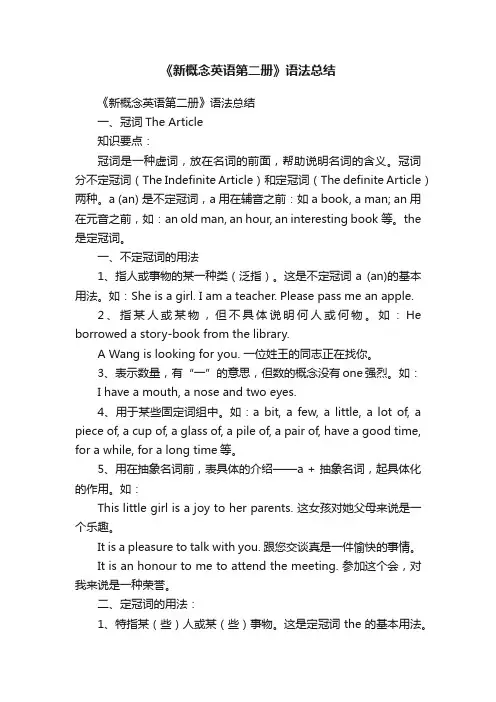
《新概念英语第二册》语法总结《新概念英语第二册》语法总结一、冠词The Article知识要点:冠词是一种虚词,放在名词的前面,帮助说明名词的含义。
冠词分不定冠词(The Indefinite Article)和定冠词(The definite Article)两种。
a (an) 是不定冠词,a用在辅音之前:如a book, a man; an用在元音之前,如:an old man, an hour, an interesting book等。
the 是定冠词。
一、不定冠词的用法1、指人或事物的某一种类(泛指)。
这是不定冠词a (an)的基本用法。
如:She is a girl. I am a teacher. Please pass me an apple.2、指某人或某物,但不具体说明何人或何物。
如:He borrowed a story-book from the library.A Wang is looking for you. 一位姓王的同志正在找你。
3、表示数量,有“一”的意思,但数的概念没有one强烈。
如:I have a mouth, a nose and two eyes.4、用于某些固定词组中。
如:a bit, a few, a little, a lot of, a piece of, a cup of, a glass of, a pile of, a pair of, have a good time, for a while, for a long time等。
5、用在抽象名词前,表具体的介绍——a + 抽象名词,起具体化的作用。
如:This little girl is a joy to her parents. 这女孩对她父母来说是一个乐趣。
It is a pleasure to talk with you. 跟您交谈真是一件愉快的事情。
It is an honour to me to attend the meeting. 参加这个会,对我来说是一种荣誉。
新概念第二册各单元的语法要点归纳
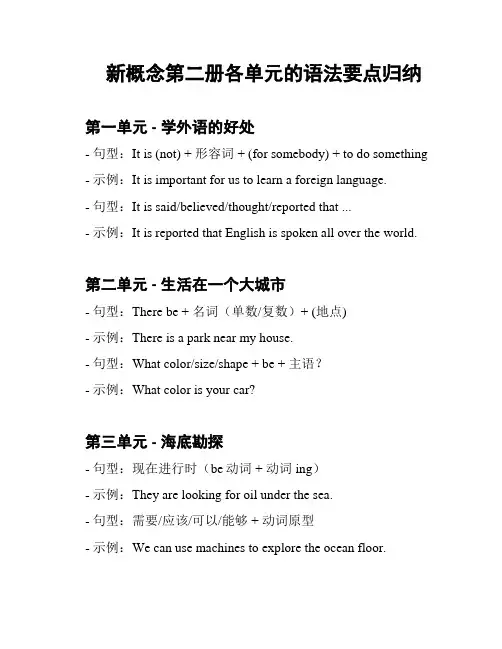
新概念第二册各单元的语法要点归纳第一单元 - 学外语的好处- 句型:It is (not) + 形容词 + (for somebody) + to do something - 示例:It is important for us to learn a foreign language.- 句型:It is said/believed/thought/reported that ...- 示例:It is reported that English is spoken all over the world.第二单元 - 生活在一个大城市- 句型:There be + 名词(单数/复数)+ (地点)- 示例:There is a park near my house.- 句型:What color/size/shape + be + 主语?- 示例:What color is your car?第三单元 - 海底勘探- 句型:现在进行时(be动词 + 动词ing)- 示例:They are looking for oil under the sea.- 句型:需要/应该/可以/能够 + 动词原型- 示例:We can use machines to explore the ocean floor.第四单元 - 名人的生活- 句型:情态动词 + 动词原型- 示例:She can sing very well.- 句型:主语 + be + 形容词 + to do something- 示例:Be patient to wait for your turn.第五单元 - 健康与健身- 句型:情态动词 + 动词原型- 示例:You should exercise regularly.- 句型:主语 + need(s) + to do something- 示例:We need to eat a balanced diet.第六单元 - 书信写作- 句型:谓语动词 + 宾语 + 动词-ing- 示例:I enjoy reading books.- 句型:It is + adj. + of + somebody + to do something - 示例:It is kind of you to help me.第七单元 - 未来生活- 句型:将来时态(will/shall + 动词原型)- 示例:We will have robots to do household chores.- 句型:It is + adj. + that + 从句- 示例:It is certain that technology will change our lives.第八单元 - 代购- 句型:情态动词 + be + adj. + to do something- 示例:I must be careful not to buy counterfeit products. - 句型:主语 + be + 形容词 + of + 宾语- 示例:The article is full of useful information.第九单元 - 旅游- 句型:现在完成时态(have/has + 过去分词)- 示例:I have visited many cities in Europe.- 句型:It is + adj./adv. + that + 从句- 示例:It is true that travel broadens the mind.。
新概念第二册语法知识点汇总
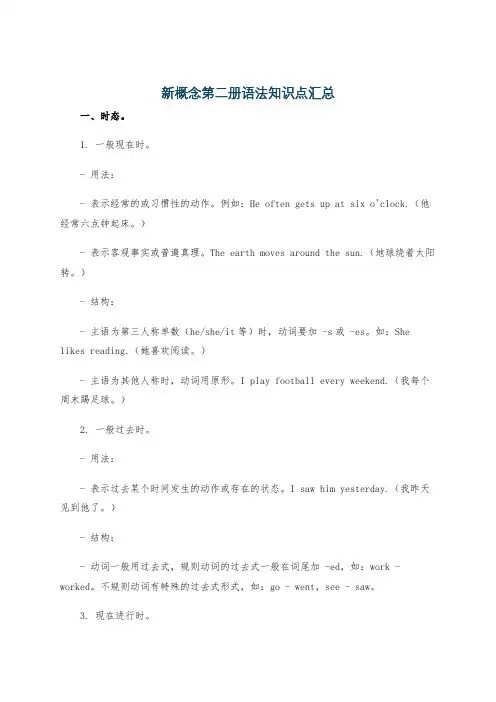
新概念第二册语法知识点汇总一、时态。
1. 一般现在时。
- 用法:- 表示经常的或习惯性的动作。
例如:He often gets up at six o'clock.(他经常六点钟起床。
)- 表示客观事实或普遍真理。
The earth moves around the sun.(地球绕着太阳转。
)- 结构:- 主语为第三人称单数(he/she/it等)时,动词要加 -s或 -es。
如:She likes reading.(她喜欢阅读。
)- 主语为其他人称时,动词用原形。
I play football every weekend.(我每个周末踢足球。
)2. 一般过去时。
- 用法:- 表示过去某个时间发生的动作或存在的状态。
I saw him yesterday.(我昨天见到他了。
)- 结构:- 动词一般用过去式,规则动词的过去式一般在词尾加 -ed,如:work - worked。
不规则动词有特殊的过去式形式,如:go - went,see - saw。
3. 现在进行时。
- 表示现在正在进行的动作。
Look! She is dancing.(看!她正在跳舞。
)- 结构:- be动词(am/is/are)+动词的 -ing形式。
He is reading a book.(他正在读一本书。
)4. 过去进行时。
- 用法:- 表示过去某个时刻或某段时间正在进行的动作。
At that time yesterday, I was doing my homework.(昨天那个时候,我正在做家庭作业。
)- 结构:- was/were+动词的 -ing形式。
They were playing football at threeo'clock yesterday afternoon.(他们昨天下午三点正在踢足球。
)5. 现在完成时。
- 用法:- 表示过去发生的动作对现在造成的影响或结果。
I have lost my key.(我把钥匙丢了。
新概念英语第二册Lesson4~6重要句型及语法
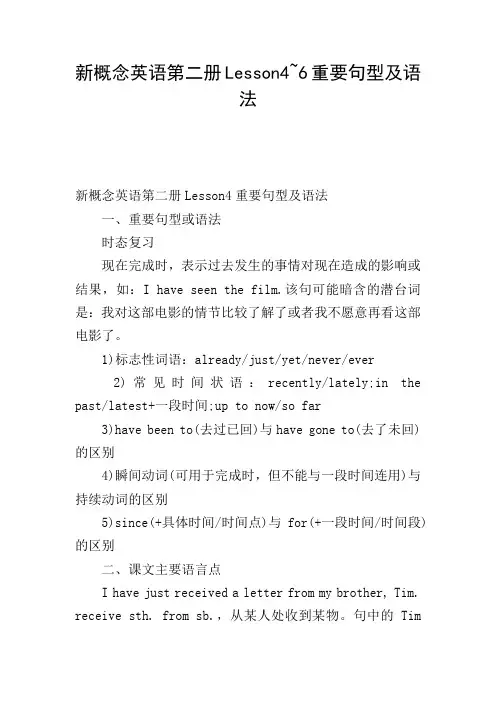
新概念英语第二册Lesson4~6重要句型及语法新概念英语第二册Lesson4重要句型及语法一、重要句型或语法时态复习现在完成时,表示过去发生的事情对现在造成的影响或结果,如:I have seen the film.该句可能暗含的潜台词是:我对这部电影的情节比较了解了或者我不愿意再看这部电影了。
1)标志性词语:already/just/yet/never/ever2)常见时间状语:recently/lately;in the past/latest+一段时间;up to now/so far3)have been to(去过已回)与have gone to(去了未回)的区别4)瞬间动词(可用于完成时,但不能与一段时间连用)与持续动词的区别5)since(+具体时间/时间点)与for(+一段时间/时间段)的区别二、课文主要语言点I have just received a letter from my brother, Tim. receive sth. from sb.,从某人处收到某物。
句中的Tim是my brother的同位语,补充说明my brother的名字。
He has been there for six months. 句中用has been,不用has gone,是因为此处表达的是他已经在澳大利亚呆了6个月了。
He is working for a big firm and he has already visited a great number of different places in Australia. work for...,表示为某人工作。
firm一般是指较大规模的公司。
a number of表示许多的、大量的,谓语动词用复数;注意与the number of(...的数量,谓语动词用单数)的区别。
He has just bought an Australian car and has gone to Alice Springs, a small town in the centre of Australia. 句中用has gone to,不用has been to,是因为此时Tim人不在说话处,而是已经去了Alice Springs。
新概念英语第二册全部语法
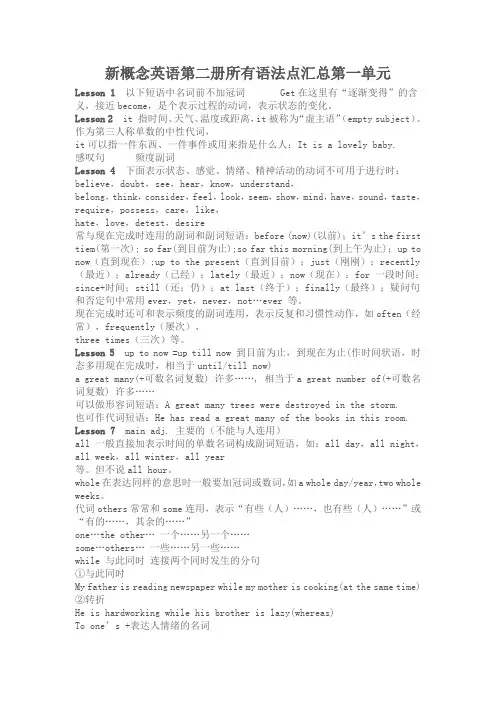
新概念英语第二册所有语法点汇总第一单元Lesson 1 以下短语中名词前不加冠词Get在这里有“逐渐变得”的含义,接近become,是个表示过程的动词,表示状态的变化。
Lesson 2 it 指时间、天气、温度或距离,it被称为“虚主语”(empty subject)。
作为第三人称单数的中性代词,it可以指一件东西、一件事件或用来指是什么人:It is a lovely baby.感叹句频度副词Lesson 4 下面表示状态、感觉、情绪、精神活动的动词不可用于进行时:believe,doubt,see,hear,know,understand,belong,think,consider,feel,look,seem,show,mind,have,sound,taste,require,possess,care,like,hate,love,detest,desire常与现在完成时连用的副词和副词短语:before (now)(以前);it’s the first tiem(第一次); so far(到目前为止);so far this morning(到上午为止);up to now(直到现在);up to the present(直到目前);just(刚刚);recently (最近);already(已经);lately(最近);now(现在);for 一段时间;since+时间;still(还;仍);at last(终于);finally(最终);疑问句和否定句中常用ever,yet,never,not…ever 等。
现在完成时还可和表示频度的副词连用,表示反复和习惯性动作,如often(经常),frequently(屡次),three times(三次)等。
Lesson 5 up to now =up till now 到目前为止,到现在为止(作时间状语,时态多用现在完成时,相当于until/till now)a great many(+可数名词复数) 许多……, 相当于a great number of(+可数名词复数) 许多……可以做形容词短语:A great many trees were destroyed in the storm.也可作代词短语:He has read a great many of the books in this room. Lesson 7 main adj. 主要的(不能与人连用)all 一般直接加表示时间的单数名词构成副词短语,如:all day,all night,all week,all winter,all year等。
新概念英语第二册语法精讲-Lesson4
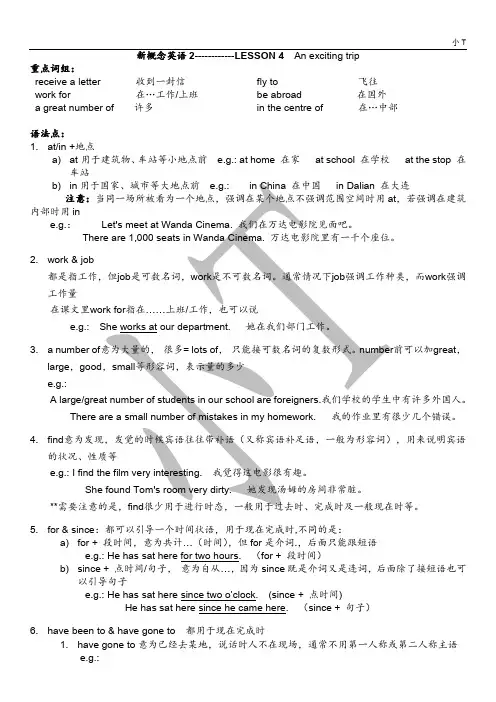
小T 新概念英语2------------LESSON 4 An exciting trip重点词组:receive a letter 收到一封信work for 在…工作/上班a great number of 许多fly to 飞往be abroad 在国外in the centre of 在…中部语法点:1. at/in +地点a) at用于建筑物、车站等小地点前 e.g.: at home 在家at school 在学校at the stop 在车站b) in用于国家、城市等大地点前 e.g.: in China 在中国in Dalian 在大连注意:当同一场所被看为一个地点,强调在某个地点不强调范围空间时用at,若强调在建筑内部时用ine.g.:Let's meet at Wanda Cinema. 我们在万达电影院见面吧。
There are 1,000 seats in Wanda Cinema. 万达电影院里有一千个座位。
2. work & job都是指工作,但job是可数名词,work是不可数名词。
通常情况下job强调工作种类,而work强调工作量在课文里work for指在……上班/工作,也可以说e.g.: She works at our department. 她在我们部门工作。
3. a number of意为大量的,很多= lots of,只能接可数名词的复数形式。
number前可以加great,large,good,small等形容词,表示量的多少e.g.:A large/great number of students in our school are foreigners.我们学校的学生中有许多外国人。
There are a small number of mistakes in my homework. 我的作业里有很少几个错误。
4. find意为发现,发觉的时候宾语往往带补语(又称宾语补足语,一般为形容词),用来说明宾语的状况、性质等e.g.: I find the film very interesting. 我觉得这电影很有趣。
《新概念英语第二册》语法精粹(含习题):句子教学文稿
《新概念英语第二册》语法精粹(含习题):句子《新概念英语第二册》语法精粹知识要点:句子按使用的目的可分为四类:1、陈述句2、疑问句3、祈使句4、感叹句从结构上看句子可分为三种类型:1、简单句2、并列句3、复合句一、句子的种类(Kinds of Sentences)1、陈述句:(1)肯定句:We love our motherland. 我们热爱祖国。
(2)否定句:They don’t go to work on Sunday s. 他们星期日不上班。
说明:叙述或否定一个事实或看法。
2、疑问句:(1)一般疑问句:Are you a worker? 你是个工人吗?Yes, I am. 是的,我是工人。
Haven’t you seen the film? No, I haven’t. 你没看过这部电影吗?没看过。
说明:以一个助动词,情态动词或动词be开始的问句。
回答要用yes或no。
(2)特殊疑问句:Who is the man? 这人是谁?When do you watch TV? 你什么时间看电视?What are they doing now? 他们现在正在干什么?说明:以一个疑问代词或疑问副词开头的句子一般要用倒装句语序(或称为疑问词加一般疑问句)(3)选择疑问句:Do you want tea or coffee? Either will do. 你要茶水还是要咖啡?哪种都行。
Does he learn Japanese or French? He learns French. 他学日语还是学法语?他学法语。
说明:提出两个或两个以上的情况,选择一个作为答案。
(4)反意疑问句:They ar e going to the airport, aren’t they? 他们要去机场,是吗?You haven’t finished your homework, have you? 你没做完作业,是吗?说明:提出情况或看法问对方是否同意。
新概念英语第二册第4课课文详解及语法解析
【导语】新概念英语作为家喻户晓的经典之作,它有着全新的教学理念,有趣的课⽂内容及其全⾯的技能训练,为⼴⼤的英语学习者提供帮助!如果你也想学好英语,⼜怎能错过新概念英语?下⾯⽆忧考为您提供了相关内容,希望对您有所帮助! 1.He is working for a big firm and he has already visited a great number of different places in Australia. 他正在为⼀家⼤公司⼯作,并且已经去过澳⼤利亚的不少地⽅了。
(1) work for… 在……上班/任职 表达“上班”这个意思时还可以说work at: She works at a department store. 她在⼀家百货商店上班。
(2)a number of只能接可数名词的复数形式。
通常,number前有great, large, good, small, certain等形容词,数量⼤⼩也随之改变: A large/ great number of our students are Danish. 我们的学⽣中有许多是丹麦⼈。
There are a small number of spelling mistakes in your homework. 你的家庭作业⾥有少数⼏个拼写错误。
2.He will soon visit Darwin. 他不久还将到达尔⽂去。
will 表⽰将来要发⽣的事。
这句话的时态是⼀般将来时。
(cf. 第12课语法)下⼀句话From there, he will fly to Perth也是⼀般将来时。
3.My brother has never been abroad before, so he is finding this trip very exciting. 我弟弟以前从未出过国,因此,他觉得这次旅⾏⾮常激动⼈⼼。
新概念英语二英语语法经典讲解Lesson4
N ew Concept English新概念英语语法经典讲解Lesson Four An Exciting Trip1. excite---exciting---excitedinterest---interesting---interesteda. The news is exciting. I’m excited.b. In my class I always try my best to excite my students在我的课上,我总会努力是我的学生兴奋起来。
李明飞的…老师是个老头/老太婆,他/她从来没有让李明飞在他/她的课上兴奋起来。
__________________________________________________________________________ …老师是个令人兴奋的人。
在他/她的课上刘伊总是很兴奋。
_________________________________________________________________________c. The book interests me.d. My English teacher is an interesting man.e. I feel interested in surfing the Net.李淼是一个很有趣的人;她对《哈利波特》‘Harry Potter’很感兴趣。
_________________________________________________________________________ 2. I’ve just received a letter from my brother.receive vt. 客观收到指的是一个被动的动作,主观上接受与不接受并不清楚。
反义词take: 拿走,随身携带指主动地拿取。
accept vt. 接受,收到a. This morning I received a bunch of flowers from a boy, but I didn’t accept it.昨天李佳芮从一个男孩那里收到了一束鲜花,但是她没有接受。
新概念第二册语法总结
新概念英语二册语法总结L1. 简单句的结构主语+谓语+宾语+状语(地点状语+方式状语+时间状语)时间状语还可以放在句首L2.一般现在时现在进行时感叹句:what+名词+主语+谓语,how+形容词/副词+主语+谓语频度副词:位于主语和谓语之间,常见频度副词及其程度的深浅:always, often, usually, frequently, sometimes, hardly, rarely, seldom, never1I always buy CDs on Sundays.L3.一般过去时直接宾语和间接宾语:主语+及物动词间接宾语直接宾语直接宾语是及物动词的直接对象,间接宾语是及物动词的动作所涉及的人或事务,也可以说间接宾语表示动作是对谁做的,或者是为谁做的。
所以间接宾语要用名词或者宾格代词来担当。
He gives me a book.me间接宾语, a book直接宾语2直接宾语和间接宾语的位置调换时要加一个介词to或for,to表示动作对谁而做,for表示动作为谁而做。
主语+及物动词直接宾语+介词介词+间接宾语Give the book to me.Send a letter to him.I bought a coat for my mother.L4.现在完成时注意频度及时间副词的位置receive/takeL5.复习3一般过去时与现在完成时的区别in the way/on the way/in this way/by the way/in a way/get out of my way/Don’tstand in my way./by the way/no wayspare/to spareL6.冠词用法1.不定冠词用于修饰单数可数名词,当一个单词的第一个发音为元音时要用冠词an, 如果是辅音用a即可。
2.不定冠词还可以用来修饰一类事物,有时候也可以省略:A cat is a lovely animal. Cat is a lovely animal. 3.不可数名词加冠词表示一类事物:Apple is a4fruit.4.如果特制某人,某物或上文提过的人或物时要用定冠词the5.Some表示一些,可以修饰可数名词及不可数名词。
- 1、下载文档前请自行甄别文档内容的完整性,平台不提供额外的编辑、内容补充、找答案等附加服务。
- 2、"仅部分预览"的文档,不可在线预览部分如存在完整性等问题,可反馈申请退款(可完整预览的文档不适用该条件!)。
- 3、如文档侵犯您的权益,请联系客服反馈,我们会尽快为您处理(人工客服工作时间:9:00-18:30)。
非谓语动词一.不定式1.定义:具有名词、形容词及副词性质并具有时态、语态变化。
2.形式:(以do为例)to do to be doneto be doingto have done to have been doneto have been doing3.用法:(1)用作主语:To speak good English is not easy.or: It is not easy to speak good English.(采用形式主语it 以避免头重脚轻)It took me an hour to do the work.(2)用作宾语:She decided to take the examination.I hope to meet him soon.(3)宾语补足语:They expected us to help them.Hewants his son to study hard.金牌重点:不定式作宾补,如谓语动词是感官动词,使役性动词(see, hear, notice,watch, make, have, let...),则不定式符号“to”须省略,但在被动语态中不能省。
I heard them sing in the classroom.I made her clean the room.The girl is heard to sing an English song.(4)用作表语:To teach is to learn.His job is to sell cars.(5)用作状语,表示目的,结果。
We come to school to study English.(目的)= in order toI hurried to the store, only to find it closed.(结果)(6)定语:不定式短语作定语须位于名词之后。
He asked for a piece of paper to write it on.= to write it on the piece of paper.The poor man has no house to live in.= to live in the house.Have you anything to do?= to do anything4.不定式的时态意义:She seems to dance very well.(现在情况)She seems to be dancing in the dancing hall.(正在进行)She seems to have danced well.(过去情况)Has was happy to have been staying with his uncle.(动作持续一段时间)5.不定式语态:The doctor recommended him to air the room.The doctor recommended the room to be aired.She expects the police to find her bicycle.She expects her bicycle to be found by the police.She felt a bit puzzled as he had asked her such a question.She felt a bit puzzled to have been asked such a question.6.不定式否定形式:not to do ...He got up early in order not to miss the train.测试精编1. Did you find out ________ the pie out of oven?A. to takeB. have takenC. when to takeD. being taken2. You would be irritated if you watched the mail ________ on your desk every day.A. putting upB. to be put upC. to pile upD. pile up3. We shall set Jim ________ the passage.A. explainingB. explainedC. to explainD. explain4. In fact, she would rather leave for San Francisco ________ in Los Angeles.A. tostayB. than stayC. than stayingD. than have stayed5. Madame Curies is believed ________ the radium.A. discoveringB. having discoveredC. to have discoveredD. to discover答案: 1. C 2. D 3. C 4. B 5. C二、动名词1.动名词定义:具有名词性质,可在句中担任主语,宾语表语,定语,具有所有格作修饰语。
2.形式:以do为例doing →being donehaving done →having been done3.用法:(1)主语:Saving is easier than doing.His coming here will be a great help.It is no use waiting here, he has left.It is no goodsmoking.There is no getting along with him.(简直无法和他相处)……以上例句皆必须要背诵!……(2)表语:His job is keeping the hall clean as possible.Seeing is believing.(3)宾语:a. 动词宾语:He admitted taking the book.I do mind your smoking here.重磅要点,请读20 遍:下列动词须跟动名词作宾语:admit, appreciate, avoid, complete, delay, deny, enjoy, fancy, finish, mind, practice, resent, risk, suggest, allow, permit...特注:以allow为例:allow + doing sth(动名词作宾语)。
但可以:Allow sb to do sth(不定式作宾补)。
这类动词常见如advise, allow, permit, recommend, etc.b. 作介词宾语:He left without saying goodbye to us.I'm looking forwardto meeting you.(to 在这里是介词)(4)定语:reading room swimming pool walking stick4.动名词复合结构:由名词所有格或物主代词与动名词构成。
His leaving is a great loss.Mother dislikes my (me) working late.John's having seen her did not make her worried.注:动名词复合结构多作主语或宾语,作主语是必须是所有格。
如上二例,但作宾语时可以用所有格,也可用普通格。
(解释得很拗口,请将例句看透即可!)5.动名词时态:I am thinking of setting a new dictionary.(以后)He never talked to me about his having been in Paris.(以前)6.动名词语态:He doesn't like being flattered.I heard of his having been chosen to be the coach of the team.7.动名词与不定式在用法上的几点比较:(1)在begin,start,continue 等词后用动名词或不定式区别不大。
He began writing / to write in 1980.(2)下列动词跟不定式或动名词所表示意义差别很大,注意使用。
(用心咀嚼!)He stopped talking. 停止讲话。
He stopped to talk. 停下来开始讲话。
Please remember to post the letter. 记住寄走这封信。
I remember posting the letter. 我记得寄出了这封信。
I forgot to lock the door yesterday. 昨天我忘记锁门了。
(未锁)I forgot telling him the news. 我忘了我曾告诉过他这个消息。
(做过的事情忘记了)测试精编1.The workers favor ________ funds to build the bridge.A. to raiseB. raisingC. raisedD. rising2. No one can avoid ________ by one's surroundings.A. to be influencedB. having influencedC. influencingD. being influenced3. She doesn't feel like ________ tonight.A. dancingB. to danceC. danceD. to be dancing4. Does Mr Wang object to ________ her the money?A. that we lendB. be lentC. lendingD. lend5. I can still recall ________ with him many years ago.A. to stayB. to stayingC. to have stayedD. having stayed 答案:1. B 2. D 3. A 4. C 5. D三.分词1.分词的性质:具有形容词性质,可以在句中担任表语、定语、宾补、状语,现在分词表示主动,且动作在进行:过去分词表示被动,或动作已完成。
